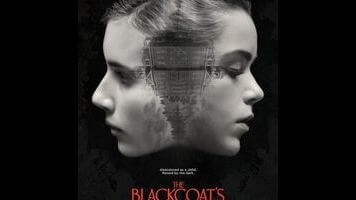The Blackcoat’s Daughter rises from release-date purgatory to give everyone the creeps

The Blackcoat’s Daughter is a clammy hand on the back of the neck, a chill running down the spine, a shot of ice water straight to the veins. Every moment, almost every shot, has been carefully calibrated to stand hairs on end. The film sets its ghastly tone immediately, with a nightmare scene that portends doom: a foreboding snowbank, a totaled car, a figure in a long, dark coat, looming malevolently in the shadows. The dream is over as quickly as it began, but its atmosphere lingers, bleeding out of the character’s subconscious and into the waking world. Know how everything in a nightmare just feels vaguely… off? That’s the dominant vibe here.
It’s the first feature written and directed by Oz Perkins, son of Psycho star Anthony Perkins and brother of the musician Elvis Perkins, who lends moaning and skittering strings to his sibling’s gooseflesh campaign. The Blackcoat’s Daughter premiered 18 months ago, when it still went by February—a more generic title, certainly, but one that didn’t make it sound like a lost Decemberists song. Still, what’s in a name? Perkins’ second feature, the oddly monikered I Am The Pretty Thing That Lives In The House, went straight to Netflix back in October, beating his debut to release. Blackcoat isn’t as radically unconventional as that haunted-house curiosity—for one, it delays its violence, rather than essentially omitting it. But both films exhibit a thrilling disregard for the prevailing rules and trends of modern horror, jointly establishing Perkins as one of the genre’s most exciting new voices.
Most of his Blackcoat’s Daughter takes place at a fictional, religious boarding school for girls, on the precipice of a long holiday weekend. It’s an unsettling setting: darkened and deserted dormitories, surrounded by dead trees, blanketed in snow. Rose (Sing Street’s Lucy Boynton), who fears she may be pregnant, gets stuck looking after freshman Kat (Kiernan Shipka) while the two girls wait for their parents to retrieve them for winter break, one day late. Trouble is, Kat’s parents aren’t coming. Something horrible has befallen them, leaving their daughter vulnerable to a dark influence. Meanwhile, another young woman, Joan (Emma Roberts), makes her way to the same sleepy East Coast town, hitching a ride with some good samaritans.
The plot is bare bones, a skeleton to drench in dread. It’s not what happens in The Blackcoat’s Daughter that will give you the creeps, but how. Perkins plays diabolical games with the chronology—muddying the timeline, replaying events from different angles, and sometimes excising the connective tissue between scenes. Performance, too, has a key role in his assault on the nerves: Shipka, who played Sally Draper on Mad Men, is a superbly unnatural presence, distracted and darkly amused, her Kat coming across like a wilting wallflower who was probably a little strange even before something started yanking at her sanity. Truthfully, nearly all the performances are pitched left of normal; it’s the kind of movie where just about any one of the characters could have malicious intentions. That could also be a byproduct of how Perkins writes and shoots his conversations, extending the dead air between lines of dialogue, or filling that void with the unholy hum of his brother’s score.
Like a lot of first features, this one betrays obvious influences. There are shades of David Lynch in its dream-logic unease, of John Carpenter in its suspenseful application of offscreen space, of The Shining in its ominous establishing shots. And, of course, any evil events going down at a girls school are going to evoke Suspiria, one of the more terrifying triumphs of style over substance. This auspicious, belatedly released debut breathes the frosty air of its genre ancestors; it’s also a kindred spirit, in artisanal spookiness, to fellow A24 release The Witch. But Perkins carves out his own identity. Scoring scares through suffocating mood, he finds fright in stillness, quiet, and isolation—the elements that make his movies feel like lying alone and awake in a dark house, letting your mind play tricks on you. Loneliness is the real lurking terror of his work, and by its final minutes, The Blackcoat’s Daughter has revealed a surprisingly affecting dimension to its satanic horror. Hell, the faithful say, is the absence of God. Maybe that’s true no matter what god you worship. Even the hell-friendly one.